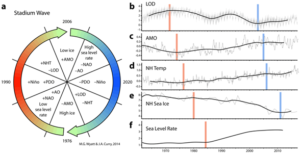by University of California – Irvine, April 26, 2018 in ScienceDaily
By taking a closer look, scientists find resilience in face of heat stress.
-
Coral reef bleaching is stark evidence of the damage being inflicted by global climate change on marine ecosystems, but a research team has found some cause for hope. While many corals are dying, others are showing resilience to increased sea surface temperatures, pointing to possible clues to the survival and recovery of these vitally important aquatic habitats (…)
See aslo here
by Eric Worrall, April 26, 2018 in WUWT
Maldives Environment Minister Thoriq Ibrahim has warned that unless the Maldives gets its climate cash before 2020, the 1.5C global warming limit will be breached.
Read more: http://www.climatechangenews.com/2018/04/26/paris-agreement-starts-2020-will-late/
This call for climate cash echoes a similar demand from African nations a few weeks ago.
I’m not sure how the Maldives reconciles their climate concerns with all their fly-in tourism and their aggressive airport and resort building programmes, but no doubt some of that climate cash will help with the reconciliation if it ever arrives.
by Javier, April 26, 2018 in WUWT
It is a well-known feature of climate change that since 1850 multiple climate datasets present a ~ 60-year oscillation. I recently wrote about it in the 7th chapter of my Nature Unbound series. This oscillation is present in the Atlantic Multidecadal Oscillation (AMO), Arctic Oscillation (AO), North Atlantic Oscillation (NAO), Pacific Decadal Oscillation (PDO), Length of Day (LOD), and Global (GST) and Northern Hemisphere (NHT) temperatures, with different lags.

To me this oscillation is not a cycle because prior to 1850 it had a more variable period and it is not well identified in LIA records. Since the origin of this oscillation is unknown, models have a hard time reproducing it and it is all but ignored by the IPCC. It is a big oscillation with an amplitude of ± 0.3 °C in NHT (0.1-0.2°C in GST; figure 2). While the long-term temperature trend is unaffected by it, there is a large effect on the 30-year trends. If this oscillation is considered, most of the climate alarmism vaporizes.
(…)
by Ph.D. Roy W. Spencer, Apritl 24, 2018 in Global Warming
Global warming “problem” cut by 50%
As readers here are aware, I don’t usually critique published climate papers unless they are especially important to the climate debate. Too many papers are either not that important, or not that convincing to me.
The holy grail of the climate debate is equilibrium climate sensitivity (ECS): just how much warming (and thus associated climate change) will occur in response to an eventual doubling of the CO2 concentration in the atmosphere?
Yesterday’s early online release of a new paper by Nicholas Lewis and Judith Curry (“The impact of recent forcing and ocean heat uptake data on estimates of climate sensitivity“, Journal of Climate) represents one of those seminal papers.
La géologie, une science plus que passionnante … et diverse

